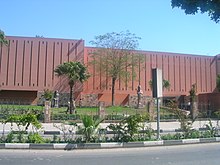Luxor Museum
 | |
 | |
| Established | 1975 |
|---|---|
| Location | Luxor, Egypt |
| Type | Egyptology, history museum, archaeological museum |
| Founder | Ministry of Culture |
| Website | sca-egypt.org |
Luxor Museum is an archaeological museum in Luxor (ancient Thebes), Egypt.[1] It stands on the corniche, overlooking the east bank of the River Nile.[2]
Establishment[edit]
The Luxor Museum was inaugurated in 1975. It is a two-story building.[2] The range of artifacts on display is far more restricted than the country's main collections in the Egyptian Museum in Cairo; this was, however, deliberate, since the museum prides itself on the quality of the pieces it has, the uncluttered way in which they are displayed, and the clear multilingual labeling used.[citation needed]
The museum was conceived by the Egyptian Ministry of Culture, which hired Dr. Mahmud El Hakim, a top Egyptian architect, to create the plans in 1962.[2] The installation of the museum art works came later and was finished between 1972 and 1975.[2]
Collection[edit]
Among the items on display are grave goods from the tomb of the 18th dynasty pharaoh Tutankhamun (KV62) and a collection of 26 New Kingdom statues that were found buried in the Luxor statue cache in the nearby Luxor Temple in 1989. The royal mummies of two pharaohs – Ahmose I and Ramesses I – were also put on display in the Luxor Museum in March 2004, as part of the new extension to the museum, which includes a small visitor centre. A major exhibit is a reconstruction of one of the walls of Akhenaten's temple at Karnak. One of the featured items in the collection is a calcite double statue of the crocodile god Sobek and the 18th Dynasty pharaoh Amenhotep III.[2]
-
Amenhotep III; circa 1390-1352 BC; quartzite; height: 2.49 m[4]
-
Scribe statue of Amenhotep, son of Hapu; circa 1390-1352 BC; granodiorite; height: 1.3 m; from Karnak (Egypt)[5]
See also[edit]
References[edit]
- ^ "Gallery of items in the Luxor Museum". Museumsyndicate.com.
- ^ a b c d e "Antiques. THE LITTLE— KNOWN TREASURES OF EGYPT'S LUXOR MUSEUM OF ANCIENT ART By Rita Reif". The New York Times. January 18, 1981.
- ^ Campbell, Price (2018). Ancient Egypt - Pocket Museum. Thames & Hudson. p. 128. ISBN 978-0-500-51984-4.
- ^ Fortenberry, Diane (2017). THE ART MUSEUM. Phaidon. p. 15. ISBN 978 0 7148 7502 6.
- ^ Campbell, Price (2018). Ancient Egypt - Pocket Museum. Thames & Hudson. p. 151. ISBN 978-0-500-51984-4.
External links[edit]
- Supreme Council of Antiquities; Luxor Museum Retrieved 22 August 2013
- Luxor: The return of two kings

![Kamose stela; circa 1550 BC; limestone; height: 2.3 m, width: 1.1 m, depth: 28.5 cm; from the Karnak Temple (Egypt)[3]](http://upload.wikimedia.org/wikipedia/commons/thumb/4/49/Kamose_Siegesstele_Luxor_Museum_02.jpg/89px-Kamose_Siegesstele_Luxor_Museum_02.jpg)
![Amenhotep III; circa 1390-1352 BC; quartzite; height: 2.49 m[4]](http://upload.wikimedia.org/wikipedia/commons/thumb/9/9f/Luxor_Museum_Amenophis_III._Statue_05.jpg/115px-Luxor_Museum_Amenophis_III._Statue_05.jpg)
![Scribe statue of Amenhotep, son of Hapu; circa 1390-1352 BC; granodiorite; height: 1.3 m; from Karnak (Egypt)[5]](http://upload.wikimedia.org/wikipedia/commons/thumb/9/92/By_ovedc_-_Luxor_Museum_-_09.jpg/95px-By_ovedc_-_Luxor_Museum_-_09.jpg)
